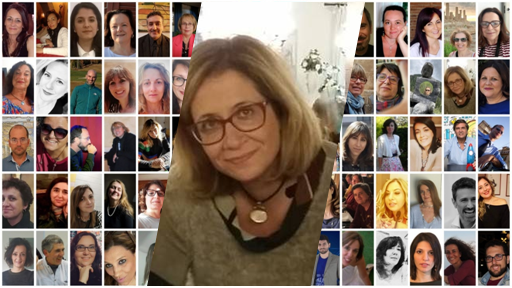Today, we meet professor, educator and researcher Nadia Gatto to focus on the issue of adult education and lifelong learning. As usual, we share a short video in which Nadia presents herself and then an interview with Ilaria Gaudiello. It’s our eleventh instalment on professors in “Our School.”

Nadia Gatto, a professor of English at provincial centres to adult education and a PhD in Italian Linguistics and Didactics for foreigners. She presented a doctoral thesis on learning objects and operative models for e-learning. She has a consolidated experience as an Instructional Designer, in particular for Italian language courses. She also trains educators, professors and tutors in teaching Italian and e-learning.

INTERVIEW
Nadia, you began teaching after a long period spent research didactics for Italian and e-learning. How can we forge models and practice, and what do you believe are the main areas to invest in for the development of adult education?
I undertook research as I was interested in better understanding what I was learning in the field. I was lucky to begin teaching Italian in a language school that placed great importance in teacher training. In that context, training included experimentation, debate, curiosity. Since then, teaching has been synonymous with research to me: field research without overlooking the theoretical research that makes it coherent, supports it and adds understanding to its transformation into practice. So, when I embarked on e-learning, I soon found myself working as an instructional designer and felt compelled to return to my studies to specialise in digital tools and integrate this with my previous studies.
Now, at the CPIA, I’m facing applied didactic practices again, but this time with Italian and foreign adults with a certain baggage of initial skills. It’s a new opportunity to conduct experiments and research in an area that is relatively new and not very explored in terms of didactic methodologies. In this sense, researcher-teachers have a lot to do! Adult education in Italy is based on courses that are custom-tailored to student needs. However, this objective still requires a lot of work. If I were to identify the areas in which to invest at present, three come to mind. The first is reception, the preliminary process that students undertake in CPIAs and that allows teachers to learn more about their students and their skills and develop the courses around them. The second is orientation based on didactic activities that help students to become aware of their potential, habits, and skills, in order to make good choices for their lives. Last but not least, so to speak, the third is digital skills, in its widest possible connotation. Access to technology is a softs skill for all courses, besides a key to becoming competent citizens and workers.
This year, you joined the “Our School” initiative to work on identifying new and older concepts, promoting technological and civic didactic innovation. What is the focus of your project idea and how does it address civic education?
The genesis of our idea was by no means easy. The parameters that we set for ourselves were tight: limiting the use of technology to smartphones, often the only device that our students have access to; guaranteeing access to the course even with basic digital skills; limiting insofar as possible the use of written and spoken texts to promote easily comprehensible iconographic representation. After a long debate and various hypotheses, our choice fell on a project that includes elements of gamification - functional for active involvement and the achievement of tangible objectives – addressing issues included in the Agenda 2030. This was a strategic choice in at least three aspects: it provides great content flexibility, it’s available in various languages and it includes iconographic elements that represent each objective. Having the same infographics in various languages is a bounty for anyone working on communication skills. We are still at the beginning and there is a lot of work to be done. The repeated closure of schools has not help us, but we will soon be ready!
The “Our School” Project currently has 120 professors in all subjects and all Italian regions working side by side to develop a high-quality inclusive school. What would you recommend for the continuation of this experience?
I would like it to become a solid community of practice providing stimuli, new ideas, and shared projects. We have joined from around Italy because there is a lot to do and a lot to decide. During this initial phase, we have all worked in small groups with other innovating professors. In my case, I already knew some, but not others and this already was enriching. Coming into contact with other professors who have stories, experience, vision and ideas is one of the most stimulating aspects of the project. Personally, I believe in meetings and networking and I hope that this initiative will give rise to David Weinberger brilliant intuition that “the smartest person in the room is the room”.


